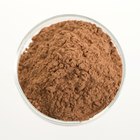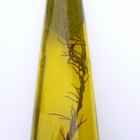A well-stocked pantry includes a selection of different culinary oils, but deciding which types are best for your cooking needs may seem a little tricky. The difference between cold-pressed and expeller-pressed oils comes down to how the oils are extracted. Cold-pressed oils are ideal when pure, unaltered taste is a must.
How Oil Is Made
To make an oil, it's necessary to remove -- or "extract" -- the oil from the plant from which it comes. To do so, the nut, seed, grain or legume undergoes a process that pulverizes and then separates the oil from the rest of the matter. This can be done in one of two ways: chemically or mechanically.
The chemical process soaks the material being extracted with a toxic solvent, such as hexane, to pull the oil from the source. The producer must then refine the oil to remove the toxin before the oil is fit for cooking. The amount of oil the producer can extract chemically is proportionally higher -- and results in a less expensive product -- than mechanical processes. Expeller-pressing and cold-pressing use no toxins during the process of extraction.
Expeller-Pressing
The first of these chemical-free mechanical processes, expeller pressing, squeezes the oil source in a mechanical press. The press does not apply any heat on the oil source or expelled oil. If the oil source is a hard-shelled nut or seed, the force of friction in the high-pressure machine may raise the temperature of the oil as it is extracted.
Cold-Pressing
Commonly used for heat-sensitive oils, cold-pressing uses the same mechanical press as expeller-pressing but in a closely temperature-controlled setting. This environment mitigates the effects of frictive heat, keeping the temperature that the oil is exposed to strictly below 120 degrees Fahrenheit. The controlled temperature keeps heat exposure from changing the oil's subtle flavor. The result is a product which, chefs and other oil purists believe, maintains the highest possible level of flavor, aroma, color and nutritional richness.
Identifying and Storing Different Oils
If you don't have access to the original label of an oil and would like to identify if it's chemically extracted, expeller-pressed or cold-pressed, you may be able to find clues. Chemically extracted oils, also known as "refined" oils, result in a clear oil without any debris or rancid taste. If the oil you're trying to identify is crystal-clear and light in color, it has likely been chemically extracted, refined, bleached and deodorized.
Mechanically extracted oils generally have a "milky" appearance, due to proteins and other plant parts that remain in the unrefined product. If the oil is not clear but still has a pleasant smell, you can be assured that the oil has not spoiled. It will go rancid if you don't store it in a cool place away from direct sunlight, as unrefined oils are sensitive to light and heat.
Related Articles

What Is Expeller Pressed Canola Oil?

Cooking Oils With Low Smell

How to Extract Oil From Rapeseed

Soya Vs. Soy Lecithin

Do You Need to Refrigerate Infused ...

Properties of Bentonite Magmas

Can Doughnuts Be Deep Fried in Olive ...

The Best Vegetable Oils for Deep Frying

What Is Clear Liquid Coconut Oil?
Does Cooking Oil Go Bad?

What Kind of Oil Do You Use in Brownie ...

How to Make Canola Oil

How to Deep-Fry Frozen Potstickers
Can Vegetable Oil Go Bad After the ...

How to Extract Eucalyptus Oil

Substitution for Oil in Baking Brownies

How to Glaze Fur

How to Discard Expired Cooking Oil

Can You Reuse Fish Frying Oil for Other ...

Which Olive Oil Is Best to Fry With?
References
Writer Bio
Annette O'Neil is an air sports athlete, digital nomad, full-time traveler and yogini. A writer for more than a decade, O'Neil has written copy, content and editorial articles for hundreds of clients and publications, including Blue Skies Magazine and Whole Life Times.